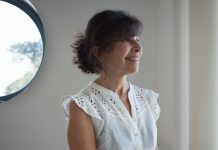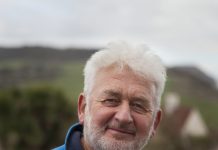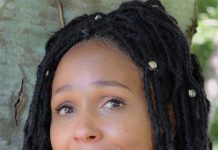Penny Johnstone met Ruth Taylor, director of the Lyme Bay Chorale, at her home in Lyme Regis. This is Ruth’s story:
‘I was brought up in London and Cambridge, but over the years my husband Norman and I often came to the West Country to walk in the hills. One very wet winter we were rained out, so went in search of a cup of tea. Unlike most places that close down, Lyme was full of people and very friendly. We never forgot it and finally moved here in 1991.
My childhood was culturally rich. I had the great privilege of having an academic father who was also a very good singer, and my mother who was a great listener. She was a Russian emigrée, a scientist – and pupil of Einstein – who later became a writer. As children we were able to concentrate on the arts, which were so much more important to my mother than whether the house was tidy.
We moved to Cambridge when I was five. Occasionally when they were bombing Coventry in the war they would misfire and our school would have to go down into the air-raid shelter. On one occasion we were making our own recorders – lovely little wooden things carved out of bamboo – and learning to play them. When the sirens went and everything was a bit scary we were all playing on these instruments and I remember noticing that it completely demolished the fear. I’ve never forgotten that. It’s been incredibly useful when I’ve been teaching people who have inhibitions, or are nervous about their abilities.
On my seventeenth birthday my parents took me to Covent Garden to see Figaro and I decided that music was what I wanted to do for the rest of my life. I went on to the Guildhall School of Music, then married very young and went out to the States. I fell into teaching when my children’s head of music was sick.
My family became my ‘opera’. They all played an instrument; the little one played the tambourine. One of them was terribly ill with encephalitis and while they were doing the spinal tap she said, could we do our round, Byrd’s Non nobis Domine. As we sang, again it broke through the fear.
After my first marriage broke up, I came back to England with the children. Encouraged by my aunt, Esther Salaman, a great mentor and wonderful singing teacher who wrote Unlocking Your Voice, I began to teach singing. My daughters, always supportive, helped me to find further pupils. I started to sing again myself, which was all part of the healing process. I sang with the Cambridge University Music Society under David Wilcocks and imbibed many of his methods in choir training.
I’ve always worked with people on the fringes of the music profession: dancers, actors and teachers, and people who’ve got lost, or come into singing late. You can improve your natural ability significantly when you are older; there are some people who have had a voice there in cold storage and never used it.
When we moved to Lyme I started working with people in a small group called “Enjoy your voice”. We established the Lyme Bay Chorale in 2000 and there are now 20 of us, plus our pianist and organist. I share the teaching with two colleagues, Ellen Nicoll and Sudhi Salooga, and everyone has a chance of voice lessons and regular coaching.
What I’m trying to do is to give the choir both the delight of performing – both sacred and secular music – and the satisfaction of studying a work in depth. We become so absorbed when we rehearse that the complications of our daily lives are forgotten. I also play the organ twice a month at Stanton St Gabriel’s church, Morecombelake, where my husband Norman, a retired Anglican priest, has been sharing the ministry with Robin Fairbrother. He organises poems for our concerts and compères with great warmth and humour. I don’t know who wrote ‘those who sing pray twice’, but I think it’s true.
Our summer concert was called “Fresh wings for soaring”. That’s a good way of describing what we do.’









